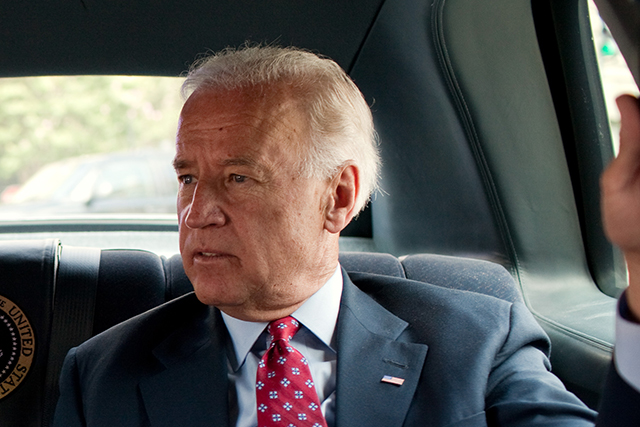In light of Russia’s recent invasion and annexation of Crimea, many of America’s allies in Central and Eastern Europe with large ethnic Russian populations are nervous. And understandably so—many are wondering if they are next on Putin’s list. In order to allay concerns, and to demonstrate U.S. commitment to transatlantic security, Vice President Joe Biden has been dispatched to the region. Sadly, his rhetoric on America’s commitment to transatlantic security isn’t matched by reality.
During his visit to Poland and Lithuania, the vice-president said all the right things. He emphasized America’s commitment to transatlantic security, and to NATO’s article five security guarantee—that an attack against one NATO member is an attack against all. Biden also went so far as to suggest that the U.S. might increase training exercises in the region.
Biden’s talk about increased training would be laughable if the situation wasn’t so serious.
In early 2013, then-commander of European Command, Admiral James Stavridis, told Congress that he was cancelling about 140 security assistance programs with European allies. The reason for the cancellation? U.S. defense cuts resulting from sequestration. His successor, General Philip Breedlove, told The Army Times that the U.S. has canceled 45 percent of military-to-military training events with European partners.
Last fall, NATO held its Steadfast Jazz 2013 exercise. This was one of the largest NATO joint exercises since the end of the Cold War, and the largest live-fire exercise since 2006. It included over 6,000 personnel from NATO members and non-NATO partners including the Ukraine.
How many troops did the U.S. send to one of NATO’s most important collective defense exercises? Only 200 soldiers—a lackluster contribution that sent the wrong message to allies and potential adversaries alike in the region.
It is not only the reduction of training that has NATO allies concerned.
In the past two years, two armored brigade combat teams have been removed from Europe. For the first time in 70 years, there is not a single American tank available for combat operations in Europe. The few that are currently in Germany are there for training only.
Funding for missile defense has also been reduced under the Obama Administration. In fact, the Government Accountability Office published a report last week suggesting that missile defense in Europe might be delayed.
Regrettably, the Obama Administration has attached little importance to the transatlantic alliance, and Europe has barely figured in the administration’s foreign policy. Now, the vice-president is sent to Europe to play catch up after years of neglect. Consequently, Europeans are left questioning America’s commitment to transatlantic relations. Who can blame them?
